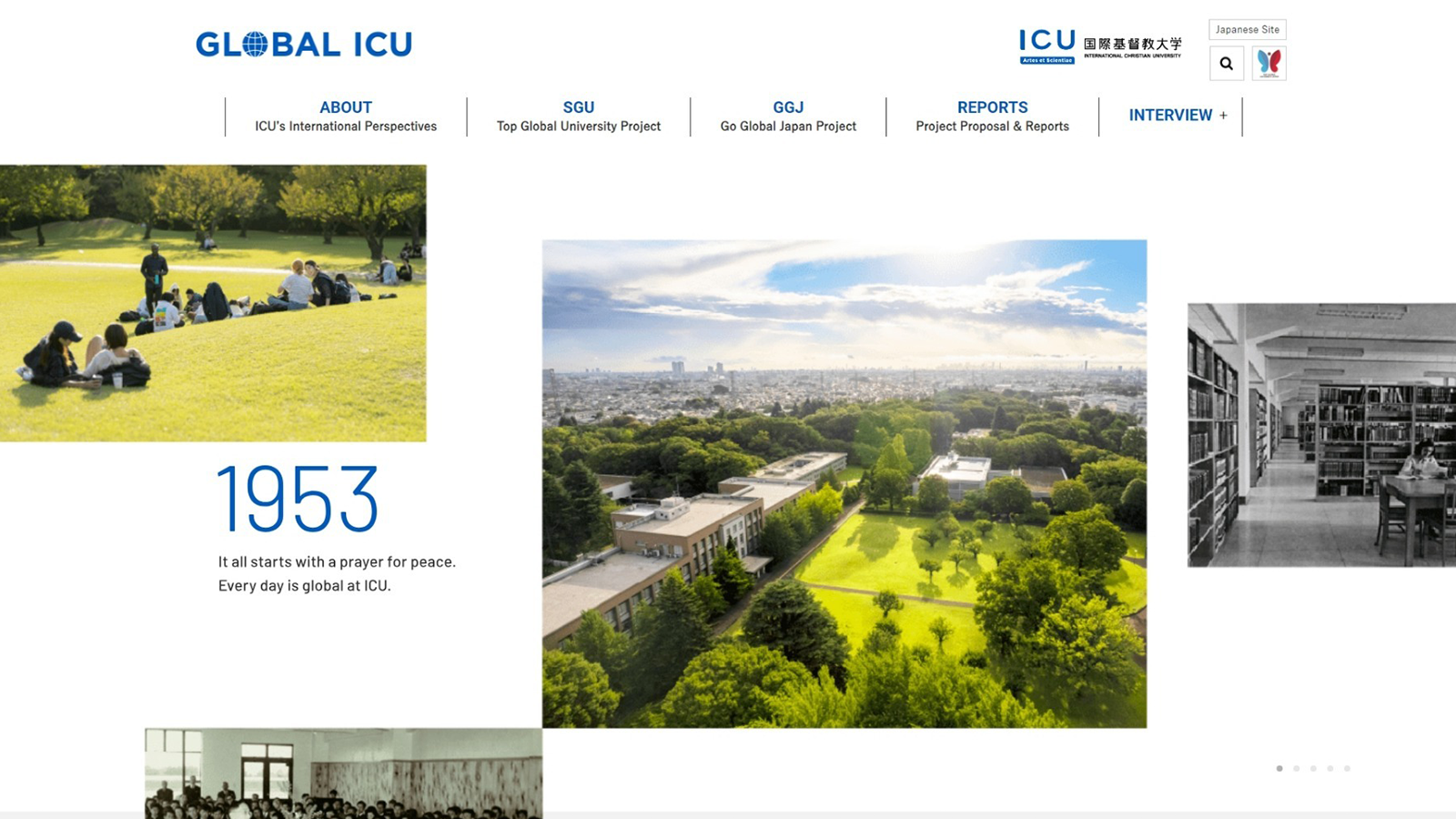
ICU President Iwakiri
and Doshisha University President Ueki
engaged in a dialogue about
the essential educational values
the two institutions have in common.
#”unfinished university” #intellectual community #alternatives #unconscious bias
*The interview was conducted at Doshisha Amherst House.
The quality of learning in higher education is now being challenged in an era of dramatic change.
With Covid-19 movement restrictions being eased, we are re-acknowledging the value of in-person exchange.
On the other hand, recent developments in AI and DX have been making waves, with organizations, including universities and research institutes, forced to adjust promptly to the likes of generative AI and ChatGPT.
ICU, which marked its 70th anniversary last year and Doshisha University, which will reach its 150th milestone next year, both offer an education based on the Christian philosophy. The two universities have developed in their unique ways to offer an international liberal arts education.
What is the essence of the philosophy that enables both institutions to cultivate and constantly develop their own culture without indulging in the trends of the times?
In President Iwakiri’s words, “The concept of the ‘University of tomorrow’ refers to one that exists in an alternative dimension from the ‘today’ of everyday human life.”
Iwakiri and Ueki both assumed their presidencies in the early stages of the pandemic, incorporating measures for Covid-19 in university management.
Their dialogue delves into the true values of a liberal arts education that will be required in the future while retaining the core universal values of university scholarship.
INDEX
- 01 Maintaining an intellectual community transcending the times that is based on the spirit of the ‘common good’ and ‘conscience’
- 02How do the two institutions assure quality in education?
- 03A skillfully designed “synergy of knowledge”
This will help bridge the distance between individuals and to create empathy - 04To navigate the dark waters of immense change, we need an alternative approach from a dimension that is not of “today"
- 05At the heart of all universities lies global relevance The importance of a unique culture that enhances this quality to the fullest
Paragraph 01
Maintaining an intellectual community transcending the times that is based on the spirit of the ‘common good’ and ‘conscience’
Through its commitment to academic study, Christianity and internationalism, ICU shares common ground with Doshisha with its mission based on Christianity, liberalism and internationalism. These are values that have become increasingly important in modern society which remains rife with division and conflict. In its medium term plan for AY2021~2025, ICU focused on the concept of the ‘common good’. Iwakiri said, “This refers to the pursuit of the good for all in a liberal and equal relationship and sharing it. The key to the realization of this goal is the intellectual community, a forum for the exchange of ideas in various fields.”
With the arrival of the pandemic in early 2020, the intellectual community faced unprecedented challenges in order to prove its worth. At the onset of their presidencies, the two administrators were forced to handle the situation with increasing limitations in terms of in-person classes and student activities on campus.
An emblematic episode at ICU at the time was a student petition demanding a partial reimbursement of the tuition fee. Students declared that, “given the tuition they had paid, they had the right to receive the benefit of in-person teaching.” Iwakiri responded by sending an email to all students. The message emphasized dialogue and offered an understanding of the concept of equality. It attracted the attention of many, inspiring a rethinking of the value of a university education amidst the pandemic.

Ueki reminisced, “I was deeply impressed by your message. This incident also made me realize that some regard universities as organizations providing services that reflect the premium paid, just like a commercial firm, presenting us with a conundrum. Universities do not provide one-way instruction: members of the community share an environment in which all should thrive. That also means we need to maintain for future generations the facilities we have built on the legacy of our predecessors. I would like students to understand the importance of the community they are part of, not just the relation between the tuition fee they pay and the outcome.”
Iwakiri agreed. “It’s important to discern the universal values that have been accumulated over the years, not just the rational benefits of tuition in the immediate form of in-person teaching. Clearly this is true when assessing the historical meaning of the university, but also, as we engage in education and research, we need to adopt a comprehensive understanding of the current landscape.”
Paragraph 02
How do the two institutions assure quality in education?
The two universities share an emphasis on the spirit of the “common good” and “conscience”, although the scale and actual measures to realize these values differ. The two presidents engaged in a dialogue to delve into the characteristics of the intellectual community from the perspective of the quality of education.
Since its foundation, ICU has constantly implemented changes and reforms, as a small-scale single College of Liberal Arts with less than 3000 students. A general education course called the “The Post-human Debate from a Liberal Arts Perspective”, offered as of AY2023, epitomizes its interdisciplinary instruction. Four faculty members specializing in international relations, psychology, literature and physics gather in a classroom to discuss the topic, “What makes us human?” from various perspectives. Originally part of the high school-university connectivity program for high school students, the course was developed for ICU students to cultivate interdisciplinary thinking. The student quota for general education courses at ICU is 150. Iwakiri said, “We believe the classrooms serve as a venue for unexpected discoveries through dialogue between faculty from many fields and students.”

Ueki mentioned developments in a similar direction at Doshisha. “We have started to introduce various courses that integrate subjects for students to study across the arts and sciences without being limited to their major. In autumn 2023, we started offering a general and liberal education courses entitled “The Doshisha Spirit and Diversity”. Faculty specializing in various fields offer 15 lectures in relay form, starting from the theory of diversity in general, moving on to sexual diversity, gender equality, multicultural symbiosis, and support for the challenged. A large number of students enrolled since it was an on-demand course. We will continue to make innovative changes in the learning system and how we offer instruction, to pique the interest of our students in a wide variety of subjects.”
ICU and Doshisha share an interdisciplinary approach to learning across the arts and sciences. But, given the difference in scale (with Doshisha a large comprehensive university and ICU a small liberal arts college), how this philosophy is implemented strongly reflects the characteristics of each institution.
Iwakiri describes the education at ICU: “We are a College of Liberal Arts with a single Division of Arts and Sciences. Our small scale makes it possible to be flexible in the education we offer, which is one of our strengths. We encourage students to focus on acquiring a perspective that allows for inquiry and solutions from a very wide range of ideas. In the first two years, students engage in learning in various fields and they choose their major at the end of their sophomore year. This process of later specialization allows them to acquire a clearer understanding of their academic interests. With a background in liberal arts that covers a wide range of academic fields, they go on to study a specific theme of their choice with the chance to further their education in graduate school. We tailor instruction according to the needs and interests of each individual student so that they can fulfill their ideals in the learning process. This is why universities need to embrace diversity.”
Ueki went on to say, “At Doshisha, we offer an environment that enables students to pursue specialization in a diverse range of fields, a forte of the comprehensive university. On the other hand, my concern is that, by having students remain ensconced in their chosen realm, this may narrow down their perspectives. At Doshisha, students can take courses in faculties and departments outside their major, but most of them are only interested in the syllabus of the department they belong to. To deal with this situation, some members of the faculty volunteered to compile a booklet introducing courses on a trial basis, initially in the graduate school, outlining each and listing the basics necessary to enroll. At the onset, some questioned the need for this, but fortunately students have reported that it encouraged them to take courses outside of their area of specialization. We will continue to pour our efforts into inspiring interest in our students, faculty and staff to make full use of our resources in education and research.”
As we considered in the “Dialogue on the Core Values of ICU #03”, ICU continues to exist as a liberal arts college with a mission to realize this educational philosophy. Doshisha provides specialized education in multiple faculties, epitomizing the comprehensive university. Both have maintained their philosophies pursuing a liberal style of learning since their respective foundations.
Paragraph 03
A skillfully designed “synergy of knowledge”
This will help bridge the distance between individuals and to create empathy
Despite the differences in scale, the two institutions share an educational philosophy of “synergy of knowledge.” ICU, as a small liberal arts college, allows students to combine any of its 31 majors to study across the arts and sciences in a high-standard educational program. But, in reality, a meaningful discussion or dialogue cannot take place without the agency of students. Similarly, at Doshisha, a comprehensive university comprising 14 faculties and 34 departments with a liberal style of learning across the arts and sciences, it is indispensable for students to be actively engaged in the learning process. What is important here is that individuals with differing views gather to exchange views and to inspire each other to create a “synergy of knowledge” by actively engaging with students’ minds and intellectual interests. In addition to curricula and programs, it is important to consider the nature of the “experiences” to which these contribute. This is a feature the two universities share in their instruction. In this section, we will consider the importance of this “synergy of knowledge” with examples from the two institutions.
At ICU, many students frequent the new Troyer Memorial Arts and Sciences Hall which opened in April 2023. As its name suggests, the building provides space for an encounter with both the sciences and the arts, for an integration of knowledge. The building houses five large classrooms, research institutes in the humanities and social sciences, and research offices and laboratories in the natural sciences. The experimental labs have glass walls so that students other than natural science majors can take a look at the process of learning in the natural sciences, all this designed to create a synergistic effect. “What we had in mind was a system whereby students could come into close proximity with what others are studying on a daily basis. The classrooms and dormitories serve the same purpose. Students majoring in diverse fields come together and engage in dialogue to get to know each other. This exchange is the source of synergy that is not possible when they are confined to a group majoring in the same field.” Iwakiri stressed that students with differing backgrounds, cultures and values engaging in dialogue in this way will become more important than ever in an increasingly global society.
Doshisha has also initiated a move involving faculty from diverse specialties. In 2020, the ALL DOSHISHA Research Model COVID-19 Research Project was established on the theme of Post-Covid Measures for Society. Symposia were held and research grants provided for 77 research themes presented by faculty. Currently the All Doshisha Research Model 2025 has been announced to support research aimed at achieving various SDG objectives in three years from 2022. Ueki says, “These activities have inspired faculty to engage in joint research projects as a result of the dialogue between those with diverse expertise at events such as symposia. We also need to encourage faculty to engage in dialogue, in addition to that among students.”
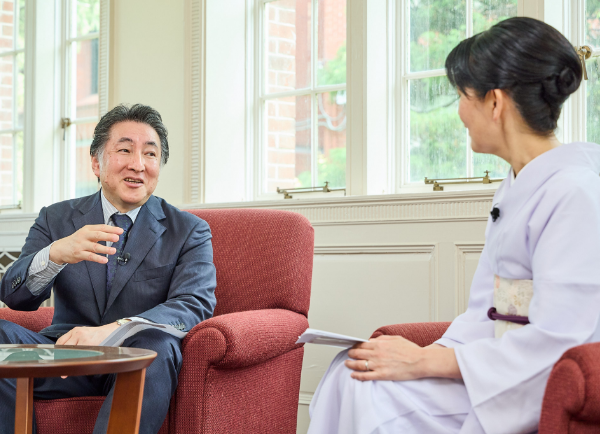
Although Japan seems to be a step behind developed nations in measures for sexual diversity, work-style reform and lifestyle in general, emphasis on diversity is gradually spreading. On the other hand, we may be evolving into a society with individuals having less empathy for each other, due to the generally diverse existing values. How do we offer students the opportunity to learn, to develop synergy and empathy and also allow them to experience failure? Providing university-inspired experiences that resonate on a human level will be increasingly important in nurturing students’ potentials to live their future lives to the fullest.
On the subject of empathy, Ueki made an interesting point. “Mikako Brady compares sympathy with empathy in her collection of essays entitled Bokuwa Ierō de Howaito de Chotto Burū (I am Yellow, White and a Little Blue, Shinchosha, 2019). Both concepts, sympathy and empathy, are commonly translated by the Japanese word kyōkan. The former expresses feelings for those you consider to have problems or are placed in a difficult position, implying a sort of emotional bond with people who have similar opinions. The latter requires an imagination about how others feel as they think differently from yourself: it is targeted at those you do not believe to be in a difficult position, or those with different beliefs and philosophies. To respect diversity, empathy as an intellectual exercise is required in addition to sympathy. I believe empathy to be the very skill that needs to be cultivated in higher education.”
Iwakiri agreed. “Your point relates to the critical thinking we emphasize at ICU. It will be more important than ever to cultivate the ability to consider an issue from diverse perspectives, to develop the discussion without immediately swallowing whole your own opinion or that of others.” He continued by noting that a scene from classic French literature points out the importance of engaging with both emotion and intellect: “In Marcel Proust’s À la recherche du temps perdu (In Search of Lost Time), the protagonist dips a madeleine cake in his cup of tea and the first bite brings back fresh memories of the past. The senses trigger the memory, but an intelligent analysis is necessary to unlock past recollections. Senses and intellect work in tandem in the pursuit of the truth.”
ICU Professor Emeritus Kazuo Kitahara has said, “Liberal arts is a skill that liberates us from biases and our preconceptions and that enables us to think freely with our own minds.” (Dialogue on the Core Values of ICU #05). Critical thinking is the backbone of liberal arts and this mode of thinking cultivates a shared understanding. It is the key to nurturing empathy with intellectual synergy. Liberalism emancipates us from fixed notions and accepted practice, which makes it possible for us to implement and continue reforms.
Paragraph 04
To navigate the dark waters of immense change, we need an alternative approach from a dimension that is not of “today"
In an era of accelerating and phenomenal change amidst the pandemic, generative AI such as ChatGPT has been the focus of attention in many industries and fields since late 2022. Specialists have pointed out numerous issues, such as the spread of misinformation, risk of information leaks and vulnerability to cyberattacks.
Generative AI is finding its way into every system, the education industry being no exception. There is ample concern at the lack of an adequate academic response when students write reports and theses using this technology. One after the other, universities have announced to students, faculty and staff guidelines on the use of generative AI and the consequences for grading. In July 2023, the Japanese Ministry of Education, Culture, Sports, Science and Technology announced its guideline, “Handling generative AI in educational matters in universities and technical colleges”; this was achieved by incorporating university guidelines and expert opinions.
Iwakiri said, “The advent of generative AI has raised the importance of the personality. Generative AI does not have emotional skills or experience; thus it is not able to engage in dialogue based on the deep thinking that humans are capable of. At ICU, we have the Division of Arts and Sciences, but when we return to the spirit of Christianity, in addition to the arts and sciences, we need wisdom that can surpass our times. All three are indispensable for complex thinking about humanity and higher education.”

Ueki went on to say, “Use of generative AI to create reports and take examinations is regarded as an imminent problem, but I believe we need to return to an essential question at this point in time. What essential skills should students cultivate at universities? How do faculty and staff evaluate the effects of learning? The Doshisha badge has three equilateral triangles resembling a clover, which symbolizes its educational philosophy of whole-person harmony through intellectual, moral and physical educations. In moral education, it is vital for individuals to find the answers, not generative AI. In standing by the moral perspectives of “conscience” and the “common good”, the path of choice will naturally become apparent.”
The presidents’ remarks show that both schools grasp the needs of the times with an ongoing commitment to improving the education offered for institutional transformation in the future.
Iwakiri said, “The concept of the ‘university of tomorrow’ epitomizes ICU’s disposition for continuous reform. Tomorrow is not a date on the calendar, but a metaphor for a dimension that is not “today”. The university is not confined to human time, so that values of the era are not automatically incorporated in instruction, while the learning offered seks to explore unchartered territory. This is what makes ICU an eternally unfinished university.”
Ueki followed, “Niijima Jō, founder of Doshisha, said it would take 200 years to fully realize the university’s ideals. We continue to strive as a developing institution to establish new degree programs, maintaining cutting-edge education and research systems. On the other hand, it will take time for their effects to be seen in our education. Not only do we need to respond immediately to changes in society, but we must also pass on the philosophy of our founders. We need to look back to where we started and discern what we need to change to stay relevant and effective. It is imperative to engage in this never-ending process: the university will be eternally ‘unfinished’.”
ICU has just marked its 70th milestone, with Doshisha about to commemorate its 150th next year. The two institutions differ in history and scale, but they share liberal arts and student-centered perspectives at the core of their education. In modern society, many students realize their dream to study despite hardship born of economic issues, family problems or the difficulties of living in conflict-ravaged areas. While the university’s alternative standpoint in sharing intelligence becomes increasingly important, both “unfinished” universities strive to make reforms. This reflects their unwavering determination to maintain and develop a liberal environment for learning.
Paragraph 05
At the heart of all universities lies global relevance
The importance of a unique culture that enhances this quality to the fullest
In recent years, Japanese universities have been offering more international and global programs, with perspectives open to the world. However, ICU has continued to offer a global standard liberal arts education in its 70-year history, and this is evident in its programs, syllabi, GPA and course numbering systems. In this part of the dialogue, the presidents discussed future plans from the perspective of global standardsi.
Iwakiri started by saying, “Universities are essentially the same the world over. Although the facilities, equipment and affiliated researchers differ, what we teach is basically the same. To establish a university means to enter a framework of common knowledge that universities around the world possess. Based on this presumption, we can probably say that all universities are founded on a global standard.”
Ueki agreed. “The objective of all scholarship is the pursuit of truth. Although we engage with differing areas, what we all do is seek questions and find answers to them. For example, when we solve a proof problem in geometry, I imagine many have found drawing additional lines useful for a new perspective. This kind of thinking can be applied to all academic fields.”
In Japan, the serious disconnect between the arts and sciences has been pointed out recently as problematic, as a deviation from the global standard. Iwakiri takes a dim view of this situation and points out the need to return to the starting point in the learning process. “The word science refers to the study of sciences in general, but its etymology is rooted in the Latin word scio which means ‘to know’. The basic concept behind the word science is the desire to know, regardless of field. The current educational system divides the arts and sciences, but we need to recognize that the bedrock of learning is curiosity.”
Ueki said, “At Doshisha, we have a popular program for graduate students and young corporate employees. They study together to create technology and products necessary for future society. Students have the opportunity to realize their ideas, while employers say they are inspired by the unique ideas students come up with. I have been made aware of the importance of providing a venue for students to think freely.”
Iwakiri continued, “the role of the university as an educational institution is to provide students with a place where they are at liberty to engage in dialogue without being forced to change or restrain their opinions.”

ICU and Doshisha respect the autonomy of each student for a liberal learning experience that extends beyond existing frameworks. This paves the way for the university’s intelligence to spread outside of the campus to society at large and the world. The culture at both universities poses no barriers among the students, faculty and staff. This deeply-rooted ambience underpins the psychological security of the students, fostering fertile ground in dialogue and experiences that are not undermined by the fear of failure. This leads to the cultivation of a global standard education.
[Postscript]
Fighting Unconscious Bias
With the recent focus on diversity and inclusiveness, unconscious bias is regarded as an issue in realizing these values.
Unconscious bias constantly stands in our way. How do we overcome this problem? We found hints of a solution in the words of the two university presidents as they seek to maintain their institutions’ liberal stances.
Iwakiri stated, “In Japan, internationalism has meant an emphasis on the use of English as a common language. ICU’s policy has been to implement a bilingual education. Studying another language in addition to your mother tongue benefits students in developing an understanding of the structure of world languages. It is very important to observe the commonalities among languages, as well as the unique linguistic characteristics in each individual, country or region.”
Ueki said, “Time performance has become a trendy concept recently, in an effort to secure maximum effect in less time. But university education is incompatible with a way of thinking that emphasizes efficiency. We need plenty of time to work with issues that have no definite answers, and also to experience failure as a rare opportunity to learn. The university must also undergo change to relay to students the value of these experiences.”
Becoming independent as an individual through language, and liberating the inner self through experience. The two institutions, for all their difference in direction, continue to pursue liberal learning as “unfinished universities.” This method of learning may be the key to freedom from unconscious bias.
In this unpredictable VUCA era, what to change and what to maintain are difficult decisions for presidents at the helm of their institutions. A keen insight into the past, present, and future and a focus on constant reform will be key to realizing a sustainable society and an education for the younger generation to live their lives to the fullest.
Related Information
Sub Dialogue
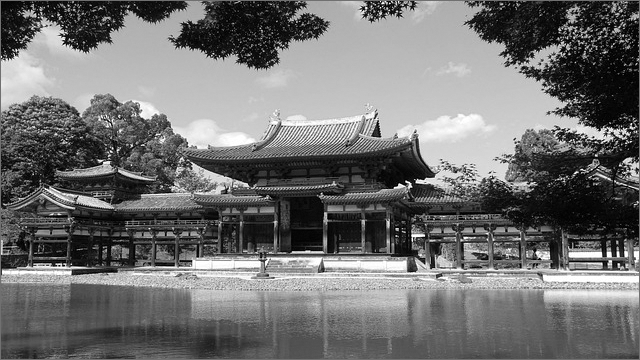
Intellectual Interaction
Multisensory learning in experiencing the “authentic”
While we depend more on ICT in the wake of the pandemic, the two presidents discussed the importance of learning in direct contact with authentic material. As the dialogue took place in Kyoto, they discussed the potential for a learning experience that can stimulate the five senses.
- Iwakiri
- The whole of Kyoto is a cultural gem. You can live your daily life in contact with a rich array of cultural artifacts. Actually, I was in Uji yesterday, where the ten Uji chapters of the Tale of Genji are set. Unfortunately, the Tale of Genji Museum was closed, but I was elated to find an ancient site around the Uji Shrine that is depicted in the fourth chapter of this Uji series, “Sawarabi.” You feel closer to the story when you actually visit places depicted and experience the ambiance of the scene, rather than by simply reading the passages.
- Ueki
- I totally agree with you. After I was appointed a member of the Doshisha faculty, it was a surprise and pleasure to see students attending class wearing yukatas during the Gion Festival. We make more use of ICT due to the pandemic, honing our skills to offer courses online, but in such cases, you rely only on your visual and auditory senses. I believe in the importance of also applying the olfactory, gustatory and tactile senses to the fullest, making direct contact with authentic material and actually visiting venues.”
- Iwakiri
- I feel the word matière, a term in art, is key here. It refers to the tactile quality of the surface in a painting or sculpture, the effect of the material used for the artwork. Even if you watch a display in high precision 8K, it would be difficult to feel the elements of matière, such as the quality of the canvas, brush strokes, and uneven texture of the paint. The experience of actually coming into contact with the authentic is invaluable.
- Ueki
- That is so true. Shigure is a motif in classic waka poetry that refers to transient rainfall between the end of autumn and early winter. In the Kanto region, where I grew up, winter is very dry with almost no rain, so it was difficult for me to imagine this type of drizzle. After moving to Kyoto, I had a thrilling “Aha!” moment when I experienced frequent rain between autumn and winter. Now I can explain more convincingly how the leaves change color with each fall of shigure, a pattern often depicted in classic waka. I would like to offer students a learning experience incorporating such sensory engagement.
PROFILE

Shoichiro Iwakiri
The President of International Christian University specializes in French literature. In 2008, he was awarded the 15th Yuasa Yoshiko Prize (Section of Drama Translation). He completed the Third Cycle and received a DEA from the Department of Science of Texts and Documents, Paris Diderot University (Paris 7). Prior to becoming ICU President in April 2020, he was Director of the Admissions Center and Dean of the College of Liberal Arts.
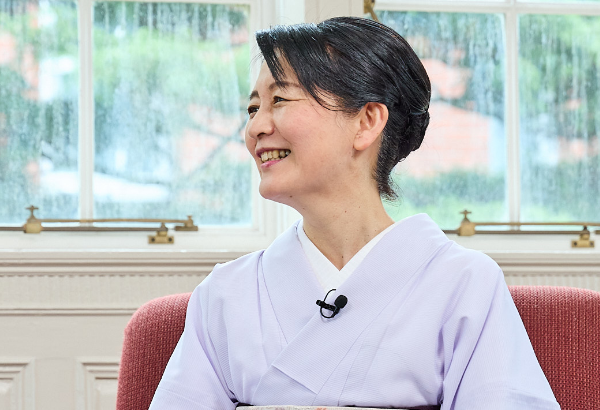
Tomoko Ueki
The President of Doshisha University, a professor in the Faculty of Letters, Department of Japanese Literature, specializes in Japanese medieval ballads and performing arts. She completed her doctorate at Ochanomizu University (Humanities and Sciences).
She was appointed Assistant Professor at Doshisha University, Faculty of Letters Department of Japanese Literature in 2005 after serving as assistant at Ochanomizu University and assistant professor at Jumonji University. Prior to her appointment as Professor in 2007 and President in April 2020 at Doshisha, she was Dean of Faculty of Letters, Dean of Graduate School of Letters, Vice President, and Executive Dean of Organization for Educational Support.


![岩切 正一郎[ICU学長]× 植木 朝子[同志社大学学長]](/knowledge/dialogue/img/dialogue09_name-en.png)
